
The Scottish Bus Group (SBG) was a state-owned group of bus operators covering the whole of mainland Scotland.
Central Scottish Omnibuses Ltd was a bus operating subsidiary of the Scottish Transport Group formed in June 1985 from Central SMT, and operated until July 1989 when it was merged with Kelvin Scottish to form Kelvin Central Buses.
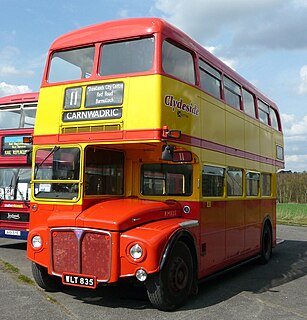
Clydeside Scottish Omnibuses Ltd was a bus operating subsidiary of the Scottish Transport Group formed in June 1985 from Western SMT Company Ltd. The company operated until May 1989, when it was remerged with Western Scottish, the successor company to Western SMT.
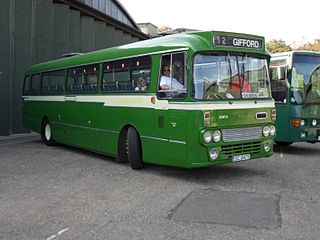
Eastern Scottish Omnibuses Ltd. was a bus and coach operator based in Edinburgh, Scotland and a subsidiary of the Scottish Bus Group. Eastern Scottish was formed in June 1985 from the main part of Scottish Omnibuses Ltd., which had itself traded as 'Eastern Scottish' since the 1960s. Following privatisation in 1990 the company traded as 'SMT' reviving the original name of the company. It operated until 1994, when it became part of GRT Bus Group plc.

Highland Scottish Omnibuses Ltd was formed as a bus operating subsidiary of the Scottish Transport Group in June 1985 from Highland Omnibuses Ltd, and operated until October 1995 when the company was split into two - Highland Bus & Coach and Highland Country Buses. The companies have since remerged and operate today as Highland Country Buses. It is now Stagecoach in the Highlands.
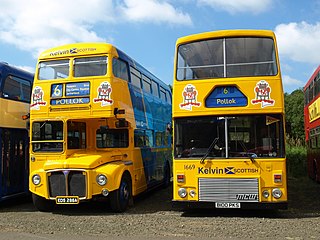
Kelvin Scottish Omnibuses Ltd was a bus operating subsidiary of the Scottish Transport Group based in Bishopbriggs, Strathclyde, Scotland. It was formed in March 1985 from parts of Walter Alexander & Sons (Midland) Ltd and Central SMT, initially with six depots and a varied fleet of 381 vehicles.
Lowland Scottish Omnibuses Ltd was a bus operator in south eastern Scotland and parts of Northern England. The company was formed in 1985 and operated under the identities Lowland Scottish, Lowland and First Lowland / First SMT, until 1999 when the company's operations were combined with the operations of Midland Bluebird in a new company, First Edinburgh Ltd. As of 26 March 2017 these operations were transferred to West Coast Motors.
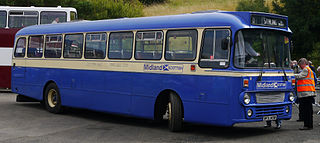
Midland Scottish Omnibuses Ltd was a bus operating subsidiary of the Scottish Transport Group formed in June 1985 from part of W. Alexander & Sons (Midland) Ltd, and operated until 1991 when it was renamed Midland Bluebird Ltd.
Stagecoach Bluebird is a Scottish bus company which operates bus services in the areas of Aberdeen, Aberdeenshire and Moray. It is a subsidiary of the Stagecoach Group.

Badgerline was a bus operator in and around Bristol from 1985 until 2003. Its headquarters were in Weston-super-Mare. Initially a part of the Bristol Omnibus Company, it was privatised in September 1986 and sold to Badgerline Holdings in a management buyout. It went on to purchase a number of bus companies in England and Wales. In November 1993, Badgerline Group was listed on the stock exchange and, on 16 June 1995, it merged with the GRT Group to form FirstBus.

The National Bus Company (NBC) was a nationalised bus company that operated in England and Wales between 1969 and 1988. NBC did not run buses itself, but was the owner of a number of regional subsidiary bus operating companies.
Walter Alexander Coachbuilders was a Scottish builder of bus and coach bodywork based in Falkirk. The company was formed in 1947 to continue the coachbuilding activities of W. Alexander & Sons when their bus service operation was nationalised. After several mergers and changes of ownership it now forms part of Alexander Dennis.

The Bristol VR was a rear-engined double-decker bus chassis which was manufactured by Bristol Commercial Vehicles as a competitor to the Leyland Atlantean and Daimler Fleetline.
The Transport Holding Company (THC) was a British Government-owned company created by the Transport Act 1962 to administer a range of state-owned transport, travel and engineering companies that were previously managed by the British Transport Commission (BTC); it came into existence on 1 January 1963.
Scottish Motor Traction (SMT) was founded in Edinburgh in 1905 by William Johnston Thomson. It operated buses in much of central Scotland. Aside from its traditional bus operations, it operated an air taxi service with a De Havilland Fox Moth between 18 July and 31 October 1932 and for many years owned Dryburgh Abbey Hotel. Following legislation, which allowed railway companies to invest in bus operators, the London & North Eastern Railway and London, Midland & Scottish Railway took a major stake in SMT in 1929. In 1930, following the takeover of another operator, SMT started its Edinburgh to London express coach service. SMT also acquired control of Walter Alexander & Sons bus services and coachbuilding operations, the Alexander family joining the SMT board.
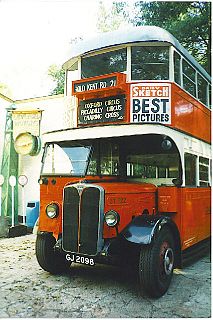
The Tilling Group was one of two conglomerates that controlled almost all of the major bus operators in the United Kingdom between World Wars I and II and until nationalisation in 1948.

Buses play a major role in the public transport of the United Kingdom, as well as seeing extensive private use. While rail transport has increased over the past twenty years due to road congestion, the same does not apply to buses, which have generally been used less, apart from in London where their use has increased significantly. Bus transport is heavily subsidised, with subsidy accounting for around 45 per cent of operator revenue, especially in London.

United Counties Omnibus was an English bus company, operating in Northamptonshire, Bedfordshire, and parts of surrounding counties.

David MacBrayne is a limited company owned by the Scottish Government. Formed in 1851 as the private shipping company David Hutcheson & Co. with three partners, David Hutcheson, Alexander Hutcheson and David MacBrayne, it passed in 1878 to David MacBrayne.
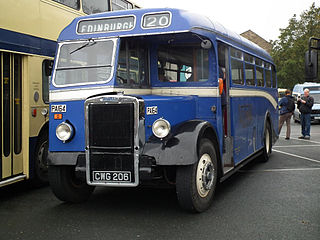
W. Alexander & Sons Ltd was a bus operator and coachbuilder in Scotland. The company grew from small beginnings to become the largest bus operator in Scotland, and one of the largest in the U.K., by the time it was split up in 1961. Its coachbuilding activities, which were transferred to a separate company in 1947, still survive as part of Alexander Dennis.














